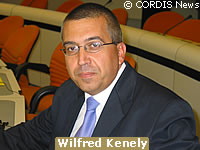Malta announces first national research programme and describes EU programmes as impetus
The impact of Maltese participation in the EU's research Framework Programmes has led to the announcement of the first ever national research programme, the Chief Executive Officer of Malta's Council for Science and Technology, Wilfred Kenely, has told CORDIS News. The programme was announced on 24 November, and Mr Kenely believes it was the direct result of Malta's involvement in both the Fifth Framework Programme (FP5) and its successor, FP6. 'Our success [in the Framework Programmes] has created a movement locally which has driven research and innovation high onto the national agenda,' said Mr Kenely. Ministers and government representatives from the acceding and candidate countries gathered in Brussels on 28 November to take stock of the countries' performance in the first round of calls for proposals under FP6. Mr Kenely declared Malta very satisfied with its success rate and the fact that 'Malta is finding its place in the European Research Area', and described the catalytic effect that this has had at home. 'Success is not just dependent on membership in consortia, but on the creation of a national framework, which will then be exported to the European Community,' he said. The Council for Science and Technology was the 'driver' of moves to establish a national research programme, Mr Kenely told CORDIS News, and the main argument that they used was: 'look what happened in the Framework Programmes. We have started to create capacity.' As a small country, Malta has its problems with regard to participation in FP6. 'Our numbers are extremely small and there are areas where we don't have any capacity, such as aeronautics,' said Mr Kenely. On the other hand, Malta is strong in information technology, biotechnology and environmental research. 'I don't think size is such an issue. It's a question of quality,' said Mr Kenely. And in any case, 'I would rather be positive,' he added. Mr Kenely praised the Commission's support for the candidate and acceding countries, singling out the specific support actions, which 'will help a lot to get us on the fast track as soon as possible.' Asked whether he would like to see any other initiatives to support his and other candidate and acceding countries, he suggested more funding for specific targeted research projects (STREPS). Smaller countries such as Malta are finding it difficult to put themselves in a position where they can coordinate the new and larger Integrated Projects and Networks of Excellence, he said. However, Mr Kenely rejected positive discrimination in favour of the candidate countries per se, saying 'the Commission should provide the tools and it's up to us to use them - and that's what's happening.'
Countries
Malta



